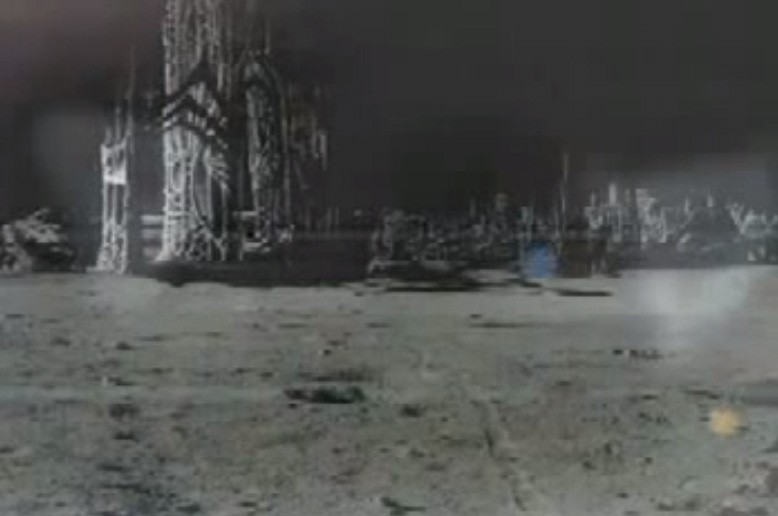 x
x
We were silent and motionless for quite some time after making contact with the ground. Maybe this behavior will seem shocking, but we felt the need to recover our wits and concentrate our energy. We were launched on an adventure one thousand times more extraordinary than that of the first terrestrial navigators and were readying ourselves to confront the wonders of interstellar travel that have fired the imaginations of several generations of writers.
For a moment, speaking of wonders, we had landed without incident on the grass of a planet that contained, as ours did, oceans, mountains, forests, cultivated fields, towns, and surely inhabitants. But we must have been fairly far from the civilized regions, considering the stretch of jungle over which we had flown prior to touchdown.
We eventually "woke up" from our daydream. Having donned our spacesuits, we carefully opened one porthole of the launch. There was no hiss of air, as the pressures inside and outside were the same. The forest surrounded the clearing like the walls of a fortress. Not a sound, not a movement, disturbed it. The temperature was high but tolerable: about 77 degrees Fahrenheit.
We climbed out of the launch, accompanied by Alexander. Professor Kaminski insisted first of all on analyzing the atmosphere by a more precise method. The result was encouraging: the air had the same composition as Earth's despite some subtle differences in the proportion of the rare gases. No doubt it was breathable, but to make absolutely sure we tried it first on our chimpanzee. Rid of his suit, the ape seemed perfectly happy and in no way inconvenienced. In fact, he seemed overjoyed to find himself free and on land. After a few skips and jumps, he scampered off into the forest, sprang into a tree, and continued his capering in the high branches. He drew farther away and finally vanished, ignoring our gestures, shouts, and pleas for him to come back to us.
Then, shedding our own spacesuits, we were able to communicate easily. We were startled by the sound of our own voices and ventured only timidly to take one step or two without moving too far away from our launch.
There was no doubt that we were on a benign twin of our Mother Earth. Life existed! The vegetable realm was, in fact, particularly lush: some of these trees must have been over one hundred and fifty feet tall! The animal kingdom soon appeared in the form of some big black birds, hovering in the sky like vultures, and other smaller ones, rather like parakeets, that chased each other chirping shrilly. From what we'd seen before touchdown, we knew that a civilization existed, too. Intelligent beings---it would have been inappropriate to call them men at this time---had molded the face of the planet. But the forest surrounding us was apparently uninhabited. This was not surprising, landing at random in some nether region of the Central American rainforest, we should have had the same impression of solitude.
Before taking another step, we felt it was urgent to give the planet a name. We christened it---Silauros!
Deciding to make an initial reconnaissance without delay, we entered the forest, following a kind of natural path. Denis Petrov and I were armed with Vityaz-SN submachine guns. As for the professor, he scorned material weapons. We felt lightfooted and walked briskly: not that our weight was any less on Earth---there again the similarity succeeded---but the contrast with the ship's force of gravity prompted us to scamper along like young goats.
We were marching in single file, calling out every now and then to Nicholas, but without success, when young Petrov, who was leading, stopped and motioned to us. A murmur, like running water, could be heard in the distance. We made our way in that direction and the sound became more distinct.
A waterfall!
On coming to it, the three of us were moved by the beauty of the site. A stream of water, clear as our mountain torrents, twisted overhead, spread out into a sheet on a ledge of level ground, and fell at our feet from a height of several yards into a sort of lake, a natural swimming pool fringed with rocks mingled with sand, the surface of which reflected the light of Chang-Er, which was then at its zenith.
The sight of this water was so tempting that the same urge seized both Petrov and me. The heat was now intense. We took off our clothes and got ready to dive into the lake. But Professor Kaminski cautioned us to behave with a little more prudence when coming up against the system of Chang-Er for the first time. Maybe this liquid was not water at all and might be extremely dangerous. He went up to the edge of it, bent down, examined it, then cautiously scooped up a little in the palm of his hand, smelled it, and wetted the end of his tongue with it.
"It can't be anything other than water," he muttered.
He bent down again to plunge his hand into the lake, when we saw him suddenly stiffen. He gave an exclamation of surprise and pointed towards something he had just discerned in the sand. I experienced, I do believe, the most violent emotion of my life. There, beneath the brutal rays of Chang-Er that filled the sky above our heads like an enormous red balloon, visible to all of us and admirably outlined on a tiny path of damp sand, was a footprint---a human footprint!
178Please respect copyright.PENANAmrq3gBDYoA
ns3.14.134.193da2 





















